How to Amplify Your Greatest Strength, Based On Your Myers-Briggs® Personality Type
We all have strengths and weaknesses that lie beyond the bounds of our personality types. But how can we harness the natural strengths of our type and really use them to make a difference in the world around us?
Yes, you have a personality type that has certain strengths and weaknesses. But you don’t just automatically become amazing at using your type. It takes some practice. Your greatest strength, in personality terms anyway, is your dominant function. If you’re not sure what that means don’t worry. It’s essentially the most natural tool in your mind to use; a mental process that doesn’t require a lot of energy for you to wield (while for others it might take an enormous amount of energy!). This is the function you live and breathe and enjoy using the most naturally and with the least amount of energy. Of course, you may develop your second or third function (don’t worry if you don’t know what those are) to a point where they also become incredible strengths. But for today, let’s focus on your dominant function.

Now some people think that using their dominant function is so easy they don’t even have to try. Others are dissuaded from using their natural strengths by family members, friends, or a society that doesn’t accept them. Still others over-rely on their strengths and ignore everything else to the detriment of their whole personality.
What we’re looking at today is how to really tap into your personality’s greatest strength and make it the best it can be. We’ll look at some questions to ask yourself and some exercises that can really help you so that you can be more in tune with what makes you…you!
Not sure what your personality type is? Take our in-depth personality questionnaire here. Or you can take the official MBTI® here.
How to Amplify Your Greatest Strength, Based On Your Myers-Briggs® Personality Type
Estimated reading time: 30 minutes
Table of contents
- How to Amplify Your Greatest Strength, Based On Your Myers-Briggs® Personality Type
- INFJs and INTJs – Introverted Intuition
- ENFPs and ENTPs – Extraverted Intuition
- ISFJs and ISTJs – Introverted Sensing
- ESFPs and ESTPs – Extraverted Sensing
- ISFPs and INFPs – Introverted Feeling
- ESFJs and ENFJs – Extraverted Feeling
- INTPs and ISTPs – Introverted Thinking
- ESTJs and ENTJs – Extraverted Thinking
- What Are Your Thoughts?
- References:
INFJs and INTJs – Introverted Intuition
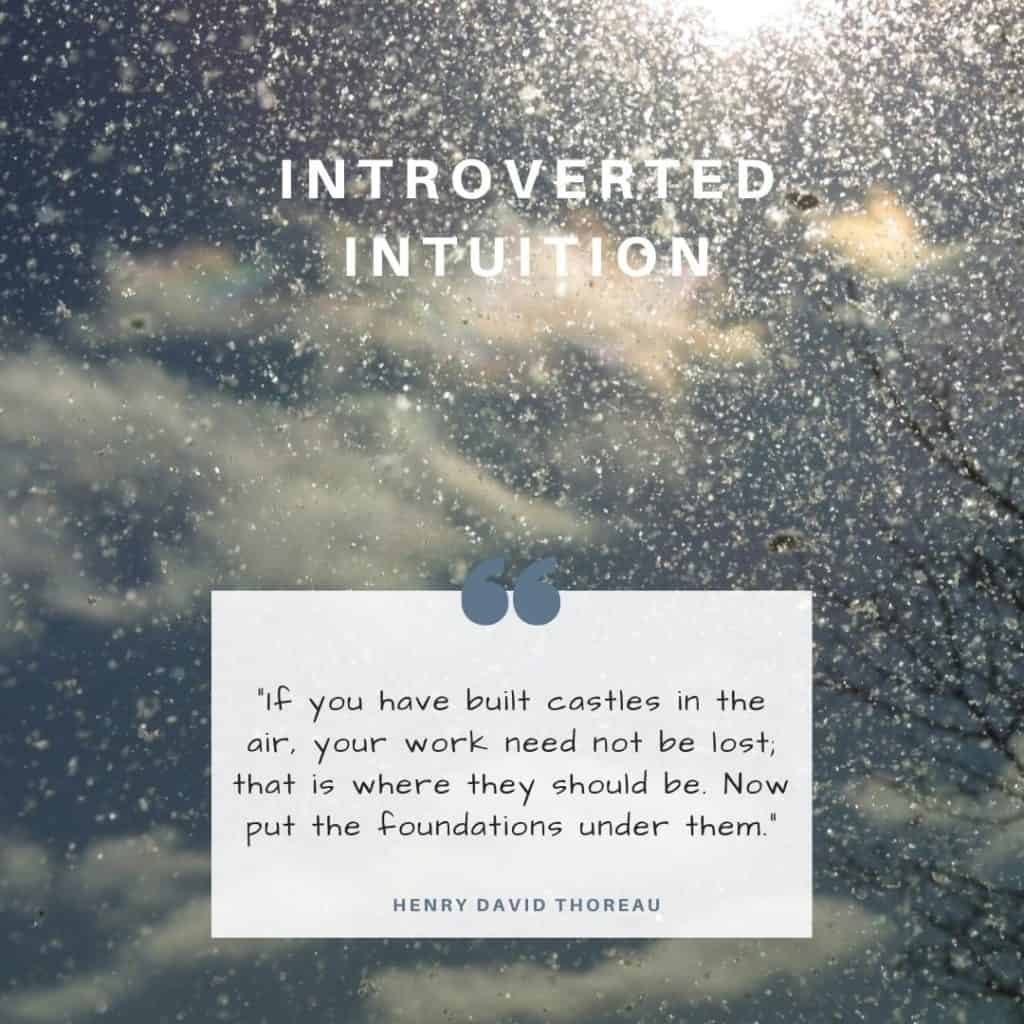
If you’re an INFJ or an INTJ than Introverted Intuition is your greatest natural strength. This doesn’t mean you have no other strengths or talents outside of your personality type. You may be a master pianist or a devoted speaker for a cause that lies close to your heart. What we’re talking about here is the greatest personality-centered strength.
As an INFJ or INTJ, having introverted intuition is like having a built-in radar, always scanning beneath the surface of things. You’re not just seeing what everyone else sees – the obvious, the commonplace. You’re a natural visionary, effortlessly spotting patterns and ripple effects that others miss. This ability allows you to anticipate future outcomes and identify underlying issues that are not yet visible to the naked eye. For example, you might know something is wrong with a family member weeks before anyone else has caught on. You night sense that a certain change will happen culturally over the next few years, but others are still living in the present unaware.
Your Introverted Intuition is your gateway to the deeper meaning of things, continually seeking to understand the broader picture. It’s as though you’re tuned into the “dance of the universe,” comprehending the grand choreography when others can only see individual steps. This unique insight is a powerful tool that, when harnessed correctly, can make a significant impact. Embrace it, develop it, and let it guide you – it’s the essence of what makes you…you!
How to Amplify Your Introverted Intuition as an INFJ or INTJ:
- Meditate: This practice can help you clear your mind and make room for deeper thought processes. Keep a pad of paper handy to jot down any insights that come to you afterwards.
- Minimize External Stimulation: By reducing distractions, you can better focus on introspection and inner exploration. Shut off phones, dim lights, and let yourself breathe.
- Find Symbolism in Art: Art is an amazing pathway for your intuition to explore. As you look at various symbols, emotions, styles, and colors, you may find yourself getting all kinds of insights, ideas, and epiphanies. You can visit a museum or just peruse art on your computer or phone!
- Ensure Time for Isolation: Spending time alone can bolster your self-understanding and help you dive into your ideas, imagination, and intuition.
- Spend Quiet Time in Nature: Spending time in nature increases creativity, helps you better reach flow, and gives you a sense of awe and wonder that is so valuable.
- Keep a Bedside Journal: Jotting down late-night thoughts or morning realizations can aid in capturing intuitive epiphanies.
- Watch Deep, Thought-Provoking Movies: This can stimulate your mind and help you gain a deeper understanding of a human problem or a cultural attitude. Many INFJs and INTJs get “aha” moments from watching deep, mind-bending films.
- Read Diverse Literature: Both fiction and non-fiction can expand your world view and stimulate your intuition.
- Play Strategy Games: These games can enhance your ability to see patterns and connect the dots.
- Ask Yourself “What Else is Going On Here?”: This question encourages you to look beyond the surface and tap into your ability to see underlying meanings, patterns, and issues.
- Devote Time to a Cause: Doing something meaningful can help you to tap into the bigger picture of life and to understand far-reaching concepts like love, sacrifice, meaning, and purpose.
- Ask Your Unconscious to Solve a Problem Before Sleep: It might seem silly or woo-woo, but this practice can allow your subconscious to work on solutions while you rest. You might be surprised by what your unconscious gives you!
- Write Down Morning Thoughts: This can aid in capturing insights or solutions that came to you during sleep.
- Contemplate Visuals and Images: Pondering the energy or meaning behind visuals can stimulate your intuition and help you spot insights you wouldn’t have otherwise.
- Project Yourself into the Future: Imagining future scenarios can engage your intuitive understanding of potential outcomes.
Find out more about INFJs and INTJs: INFJ vs INTJ: Which One Are You?
ENFPs and ENTPs – Extraverted Intuition
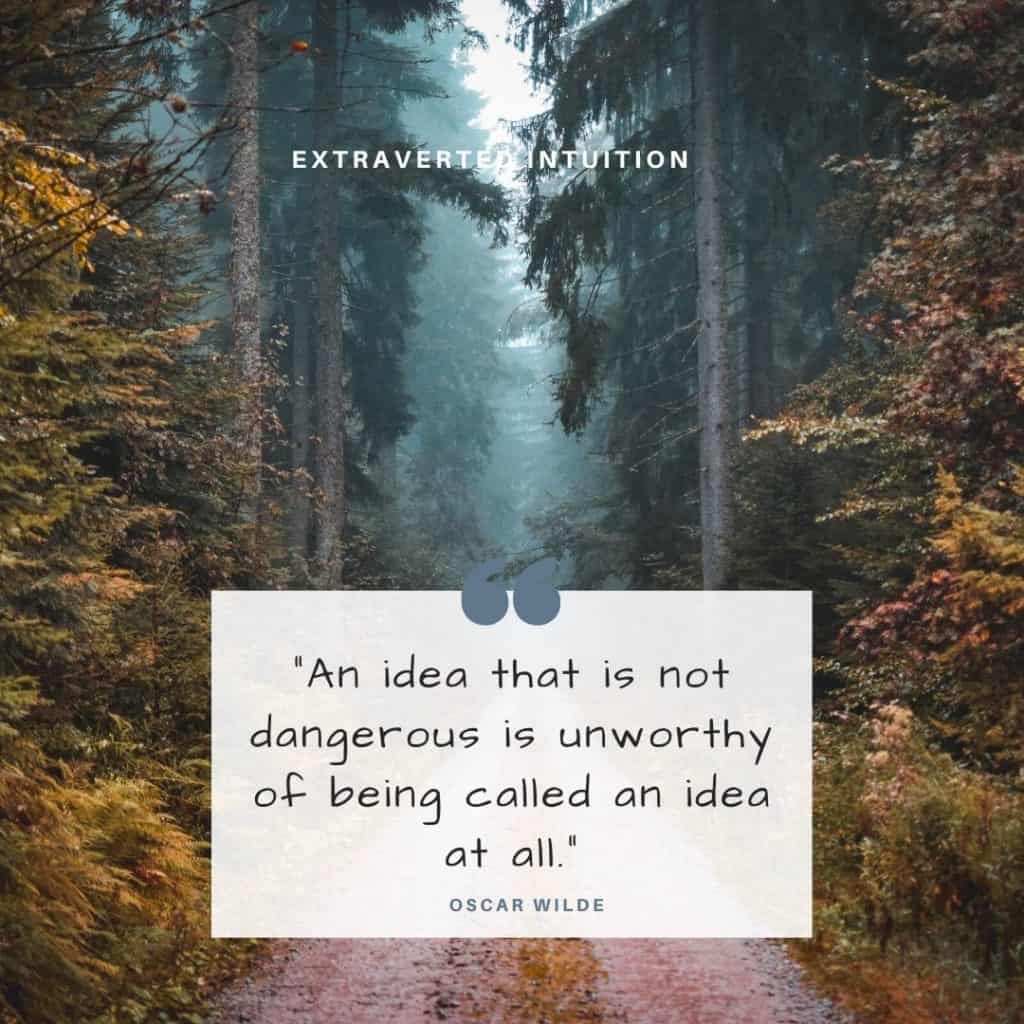
If you’re an ENFP or an ENTP, then Extraverted Intuition is your dominant function. This doesn’t mean you have no other strengths or talents outside of your personality type. You might be an exceptional writer or a brilliant entrepreneur. What we’re talking about here is your greatest personality-centered strength.
As an ENFP or ENTP, your Extraverted Intuition is like having a kaleidoscope of possibilities and ideas in your mind. You are not just thinking linearly or conventionally; you’re an innovative thinker, naturally making connections and seeing potential where others don’t. This ability allows you to generate a myriad of ideas and consider a broad range of possibilities, making you an excellent problem-solver. As an example, you might see a business failure as a catalyst for a dozen other startup ideas where you could solve the very problem that brought your business down for other entrepreneurs! Or, in a more tangible sense, you might spot some discarded old jewelry on the ground and find a way to make something beautiful out of it.
Your Extraverted Intuition is your window to the horizon of the unexplored, constantly seeking new ideas, possibilities, and connections. It’s as though you’re tuned into the “symphony of the universe,” integrating different elements and ideas into a harmonious ensemble while others are still focusing on individual notes. This unique capacity is a powerful asset that, when harnessed correctly, can lead to exceptional creativity and innovation. Nurture it, perfect it, and let it guide you – it’s the quintessence of what makes you extraordinary!
How to Amplify Your Extraverted Intuition as an ENFP or ENTP:
- Brainstorming Sessions: Regular brainstorming sessions can stimulate your mind and aid in generating new ideas.
- Engage in Debates: Tapping into different perspectives and coming up with arguments or alternative possibilities on-the-spot is a great way to harness your intuition. Just make sure the debates are not mean-spirited in nature!
- Keep an Idea Journal: Write down all your ideas, no matter how outlandish. This can help you keep track of your thoughts and possibly combine ideas to create something new.
- Read Widely and Diversely: Reading expands your horizons and fuels your mind with new ideas and possibilities. The more you read, the more about life you understand the more empathy you’re able to gain as well!
- Travel and Explore: This can expose you to different cultures, ideas, and perspectives, stimulating your intuition and inspiring you to embark on new pathways.
- Learn New Skills: This keeps your mind active and engaged, and you never know when these new skills could connect to create something innovative.
- Ask Yourself “What If?”: This question encourages you to explore all possible outcomes and consider different solutions. Even if your “What if?” seems unrealistic, give it a go! Maybe it will spark something completely new. After all, Walt Disney was an ENFP. Imagine what would have happened if he’d never asked himself, “What if?”
- Engage in Creative Activities: Painting, writing, music, or any other creative activity can stimulate your mind and intuition.
- Network and Socialize: Meeting new people can provide you with new perspectives, ideas, and possibilities. Plus you’ll gain better social skills as a byproduct!
- Stay Curious: Always be open to learning new things, as this can feed your intuition with new information and ideas. Just don’t let yourself drown in information overload! Give yourself little breaks to ponder what you’ve learned.
- Allow Time for Reflection: Reflecting on your experiences and ideas can often provide new insights and connections.
- Be Open to Change: Embrace change and see it as an opportunity for new possibilities.
- Look for Patterns: Keep an eye out for recurring themes or trends in your daily life, your interests, or your work. Identifying these patterns can offer you new insights and potentially spark innovative ideas.
- Re-think Routines That Aren’t Helping You: If a particular routine or habit isn’t contributing positively to your life or hindering your progress, it’s time to reassess and make necessary changes. This process may open up opportunities for new ideas to flourish.
- Generate a List of New Business Ideas You Could Pursue: Write down any business idea that comes to your mind, no matter how unconventional it seems. Then, identify the constraints or challenges associated with these ideas and brainstorm on how you could possibly overcome these hurdles.
- Reframe Problems as Opportunities: Any problem or challenge you face can be seen as an opportunity for growth and learning. When you adopt this outlook, you’ll find that there are numerous opportunities for innovation and creativity in every situation.
Find out more about ENFPs and ENTPs: The Unique Intelligence of ENFPs, ENTPs, INFPs, and INTPs
ISFJs and ISTJs – Introverted Sensing
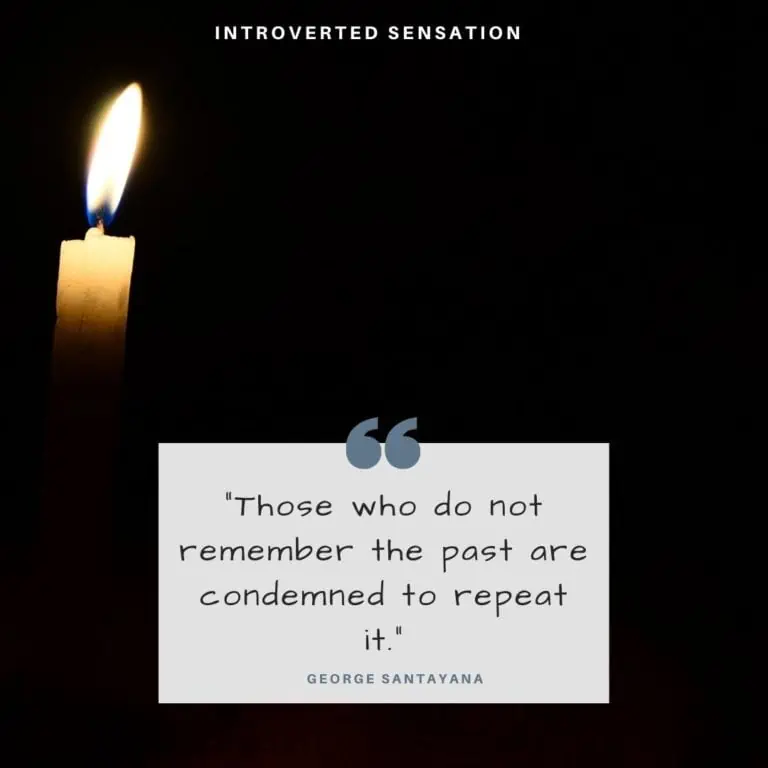
If you’re an ISFJ or an ISTJ, then Introverted Sensing (Si) is your dominant function. As with all the personality types, we aren’t saying that the only thing you can really master is this one feature of Introverted Sensing. You might be a proficient scientist, a songwriter, or a skilled teacher. In this article, we’re focusing primarily on the greatest strength of your typology or type-code.
As an ISFJ or ISTJ, your Introverted Sensing is like having a vast library of experiences and details stored in your mind that you can call upon when required. You’re not just thinking in terms of the present or future, you have a deep appreciation for traditions, details, and wisdom from the past. Your primary focus is on providing stability and securing the present by using age-old lessons and lived experience. You know anyone can hypothesize anything; but you know what’s worked before is what really can be trusted. Evidence, experience, reality; you trust these things. This ability allows you to be meticulous and dependable, with an extraordinary attention to detail.
Your Introverted Sensing is your pathway to the past, providing a consistent point of reference and allowing you to learn from experiences to make better decisions in the future. It’s as though you’re constantly analyzing and organizing the world around you based on the solid facts and details you have stored away. This unique capability is a valuable asset that, when carefully cultivated, can lead to exceptional reliability and practicality. Embrace it, perfect it, and let it guide you – it’s one of the many things that makes you remarkable!
How to Amplify Your Introverted Sensing as an ISFJ or ISTJ:
- Enjoy Detail Oriented Tasks: Engage in activities that require attention to detail. This could be anything from hobbyist model making to intricate embroidery. I know many ISTJs and ISFJs who love Jigsaw puzzles!
- Keep a Memory Journal: Writing down important events and experiences can help you remember them better in the future. Especially remember to jot down the lessons you learned from your experiences.
- Maintain (or Create) Traditions: Preserving family or cultural traditions can be a great way to engage your Introverted Sensing and preserve moments that have particular meaning to you.
- Practice Mindfulness: Be present in the moment, focusing on the sights, sounds, and feelings around you. Do this in a peaceful setting, like on a nature walk, to really notice what stands out. You’ll improve your well-being, creativity, and health as a result!
- Embrace Healthy Routines: Develop routines for meals, exercise, and self-care. Your Introverted Sensing will appreciate the consistency and you’ll feel better as a result!
- Pursue Historical Exploration: History is a storehouse filled with lessons and provable wisdom that you can apply to everyday life. Read biographies, watch documentaries, and let your insight expand!
- Learn from Your Mistakes: After any failure or mistake, take time to analyze what went wrong and how you can improve. This is one of the greatest superpowers of Introverted Sensing.
- Try Out Physical Activities: Calm physical activities are a great way to tap into your inner sensory world. Go canoeing, rock climbing, hiking, or swimming to really hone in on the details and master your sensory awareness.
- Be Patient with Yourself: Changes and new situations can be difficult for ISTJs and ISFJs. Allow yourself time to adjust and don’t pressure yourself to rush.
- Ask for Details: When learning something new or making a decision, ask for as many details as possible. This helps you create a thorough mental picture of the situation.
- Reflect on the Past: Spend time reminiscing about positive experiences from the past. This can be a source of comfort and joy and really help you to know what brings you satisfaction.
- Provide Practical Help: Think about someone you know that’s going through a problem. How can you provide a practical, tangible solution? For example, if someone you know is sick, could you make them a hot meal?
- Re-watch favorite childhood movies: Nostalgia can be refreshing for Introverted Sensing dominant types. Your favorite childhood movies will often bring back memories and feelings that are deeply comforting to you.
- Visit a place you loved in childhood: Really take it in. What does this experience remind you of? What insights can you glean from this? What memories do you think of?
Find out more about ISFJs and ISTJs: 10 Unique Qualities of the ISFJ, ISTJ, ESFJ, and ESTJ Personality Types
ESFPs and ESTPs – Extraverted Sensing

If you identify as an ESFP or ESTP, your dominant function is Extraverted Sensing (Se). Similar to other personality types, this doesn’t mean that you are limited to mastering only this part of your personality. You may be a successful entrepreneur, a skilled artist, or an eloquent public speaker. However, in this article, our primary focus lies on the core strength of your personality type.
As an ESFP or ESTP, your Extraverted Sensing allows you to fully immerse yourself in the present moment, experiencing and responding to the world around you in a direct and immediate way. You are aware of what’s happening around you and are quick to respond to it. You’re the person who notices the here and now – the colors, sounds, tastes, and textures of the world are more vivid to you than to others. You’re also adept at immediately spotting changes in your environment, making you quick to react and adapt when necessary. On top of that you are realists, aiming to keep a steady, down-to-earth outlook on life. As an example, when a crisis erupts you might be the first to jump in with the necessary resources and tools. Instead of panicking about all that “could be” you’re firmly entrenched in the moment, spotting what’s happening now, what’s needed now, and what’s relevant.
Your Extraverted Sensing is your gateway to the world, giving you a deep appreciation for all that is beautiful, exciting, and tangible. This unique attribute, when harnessed effectively, can lead to an engaging, spontaneous, and zestful life. So, embrace it, refine it, and apply it – it’s one of the many things that make you stand out.
How to Amplify Your Extraverted Sensing as an ESFP or ESTP:
- Engage in Physical Activities: Immerse yourself in activities that stimulate your senses, like sports, dance, or adventurous travel. These experiences allow you to feel alive and connected to the world.
- Develop Artistic Skills: Whether it’s painting, cooking, or photography, cultivate your natural ability to appreciate beauty by creating it yourself.
- Practice Mindfulness: Consciously tune into your senses throughout your day. Notice the sounds, sights, and smells around you in detail. Don’t just eat your food; savor every bite and notice every nuance of flavor.
- Learn Through Doing: You learn best by hands-on experience, so try new things, make mistakes, and learn from them.
- Maintain a Healthy Lifestyle: Your body is the primary tool through which you experience the world, so keep it healthy and strong. Make sure you’re drinking enough water, exercising, and getting enough sleep!
- Stay Open to Change: You love a spontaneous change in plans or a new surprise or opportunity that can keep you on your toes. Stay open to these things to explore new adventures and bits of experience and knowledge that can help you grow!
- Be Proactive: You’re great at responding to the environment and taking immediate action. Use this to your advantage.
- Appreciate the Beauty Around You: Take time to consciously appreciate the beauty in the world. This can be as simple as a sunset, a well-cooked meal, or a beautifully-painted mural.
- Interact with the Environment: Regularly interact with your environment, whether it’s by walking in nature, playing with pets, or exploring a new city. This will keep your senses sharp and your connection with the world strong.
- Embrace Variety: Variety is the spice of life for you. Don’t hesitate to change things up, whether it’s your routine, your environment, or even your style.
- Practice Reading People: Start noticing small details about people – their movements, their breathing patterns, the dilation of their pupils. These subtle cues can offer a wealth of information about their emotions and intentions, helping you to understand them better and respond appropriately.
- Notice Resources and Use Them: Always keep an eye out for resources that are readily available around you. Think about how you can utilize these resources to solve a problem or create something new. This will not only improve your problem-solving skills but also your ability to adapt and innovate.
- Experiment with Cooking: Cooking is both an art and a science, and as someone who appreciates tangible, sensory experiences, you may find joy in the kitchen. Try adding a new spice or ingredient to a recipe you’ve made before, or venture out to try a new recipe entirely. This will not only tantalize your taste buds but also stimulate your creativity.
- Provide Practical Support for Someone: If you know someone who’s going through a tough time, consider offering a practical, tangible way to help out. This could be anything from shoveling snow from their driveway to helping them with groceries or childcare. Your action-oriented nature can be a real lifeline for those in need.
Find out more about ESFPs and ESTPs: The Unique Intelligence of ESTPs, ESFPs, ISTPs, and ISFPs
ISFPs and INFPs – Introverted Feeling
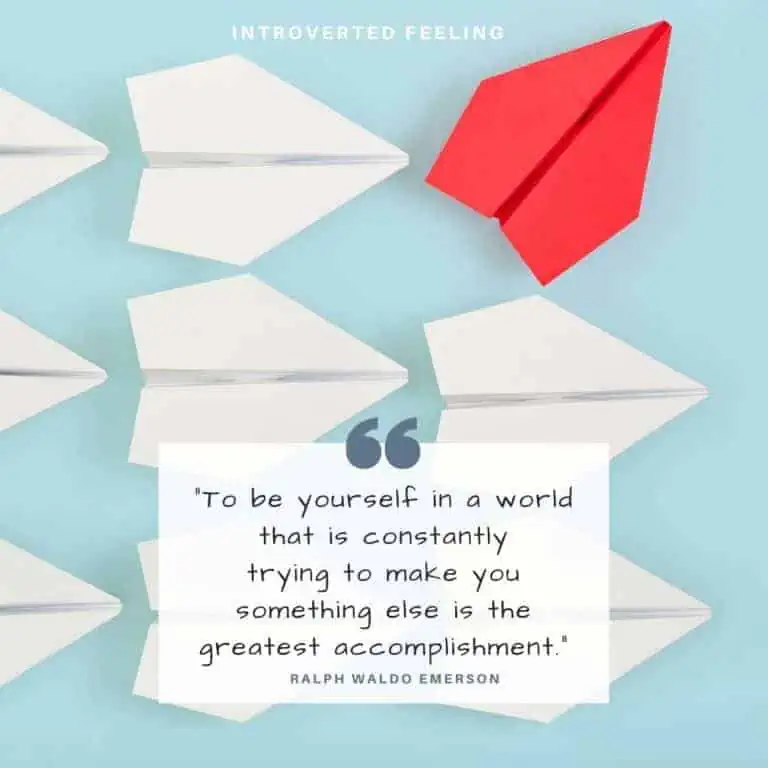
If you identify as an ISFP or INFP, your dominant function is Introverted Feeling (Fi). As with all the personality types, this doesn’t limit you to only this one aspect of your personality. You might be a visionary artist, an accomplished athlete, or have a number of other developed talents. In this article we’re trying to shine a light on the core strength inherent to your personality type; not a talent you’ve learned along the way.
As an ISFP or INFP, your Introverted Feeling guides you in navigating the world around you based on your inner values and moral compass. This inward focus allows you to have a deep understanding of yourself and your feelings, and to deeply align your life with your core beliefs and values. You strive to be unflinchingly honest, authentic, and to live a life with conviction and integrity. It’s not about following some pre-established set of rules or morals; it’s about knowing what’s right within your heart and making sure you’re aligned with that at every moment. Your Introverted Feeling questions things: “Is this really right or is someone just telling me it’s right?” “Do I really believe in this societal value or should I defy it?” “What is my heart telling me?”
Introverted Feeling gives you a sensitivity to your feelings and the feelings of others. You can easily put yourself in others shoes; understanding via your own experiences and memories and emotions how others might feel. You can also easily spot when someone is being manipulative, fake, or dishonest. Intentions are something you can spot much sooner than many other personality types can.
Introverted Feeling is your pathway to understanding and expressing your authentic self. When properly utilized, it can lead you to a meaningful and fulfilling life that aligns with who you truly are. So take ownership of it, refine it, and put it to use – it sets you apart from others.
How To Amplify Your Introverted Feeling as an ISFP or INFP:
- Make Time for Self-reflection: Regularly set aside time for self-reflection. This will help you to better understand your feelings and values, and how they influence your decisions.
- Express Your Feelings Creatively: As creative individuals, expressing your feelings through art, music, or writing can help you understand and communicate your emotions more effectively.
- Stand Up for Your Values: Don’t shy away from standing up for what you believe in, even if it goes against the grain. This will strengthen your core values and your self-confidence.
- Seek Harmony: Strive to create harmony in your environment. As someone who values internal consistency, a peaceful outer environment will reflect and nurture your inner calmness.
- Maintain Authentic Relationships: Be honest and genuine in your relationships. You value authenticity and should seek it in your relationships.
- Pursue a Cause: Find a cause you are passionate about and devote your time and energy to it. This can help you live a life aligned with your values, and provide a platform where you can make a difference.
- Make Time for Mindfulness: Incorporating mindfulness into your daily routine can help you become more in tune with your emotions and values. It provides a space for self-reflection and introspection.
- Journal Your Thoughts and Feelings: Regular journaling can be a conduit for understanding and expressing your inner feelings. It allows you to name your emotions and identify the values that are connected to them.
- Watch Movies and Read Books: Engage with diverse forms of media to broaden your emotional understanding of the world. Stories can offer insights into different perspectives and experiences, helping you to empathize more deeply.
- List Five Things You Would Die For: This exercise can help you identify your core values. By considering what is most important to you, you can better align your actions with your beliefs.
- Listen and Understand Others’ Values: Practice active listening when others express their values. Try to understand their perspective and communicate your comprehension back to them. This can lead to deeper, more meaningful conversations.
- Practice Saying ‘No’: If something doesn’t align with your values, don’t be afraid to say no. This can reinforce your commitment to your values and prevent you from feeling compromised.
- Notice Other People’s Values: Start observing the values expressed by those around you. Consider which ones resonate with you and reflect on why that might be.
- Listen to Emotion-Enriching Music: Music can be a powerful tool for exploring your emotional landscape. Choose songs that resonate with your feelings and allow yourself to fully experience the emotions they evoke.
Find out more about INFPs and ISFPs: Are You an ISFP or an INFP? Clarifying a Common Mistype
ESFJs and ENFJs – Extraverted Feeling

If you identify as an ESFJ or ENFJ, your dominant function is Extraverted Feeling (Fe). You are all about community, connection, unity, and support. You’re the person who is often social glue holding people together; bringing people together and noticing their needs and feeligns. This is not to pigeonhole you into some stereotype; this is simply a glimpse into the potent strength that lies at the heart of your personality type.
Extraverted Feeling empowers you to relate to and understand others deeply. You are sensitive to the emotional climate around you and tend to absorb the feelings of others. Your Feeling side guides you in making decisions that consider the needs and emotions of the group, fostering a sense of harmony and cooperation. You innately understand that we are interconnected, and you use this understanding to build bridges between people. You are skilled at reading others’ emotions and responding in a way that brings comfort and support.
When used optimally, Extraverted Feeling can serve as a beacon of hope and strength for those around you, creating a community bound by empathy and mutual respect. So embrace it, cultivate it, and implement it – it is your unique strength.
How To Amplify Your Extraverted Feeling as an ESFJ or ENFJ:
- Practice Active Listening: Strive to be present and attentive when interacting with others. Active listening not only demonstrates your care and respect but also allows you to understand their feelings fully and avoid misunderstandings.
- Express Empathy: Make it a practice to acknowledge and validate the feelings of others. This fosters a sense of understanding and rapport and should come fairly easily to you.
- Promote Harmonious Environments: Work to create environments that promote peace and collaboration. Your ability to create environments of good-will and unity is a strength that the world deeply needs right now.
- Communicate Effectively: Use your natural ability to understand and articulate emotions to communicate clearly and effectively. This ability will help others feel more free and confident in expressing their true feelings as well.
- Support and Help Others: You have a gift for seeing where others need support or emotional nurturing. Use this gift to make a difference in the lives of others and form closer bonds!
- Engage in Team Activities: Participate in group activities that foster camaraderie and cooperation. This allows you to harness your strength for bringing people together.
- Cultivate Emotional Intelligence: Nurture your ability to recognize and understand emotions in yourself and others. Read books, watch movies, and interact with people in ways that will broaden your understanding of the human experience.
- Practice Self-Care: While you are naturally inclined to care for others, don’t forget to take care of yourself. Self-care helps maintain your emotional well-being, allowing you to continue supporting others without getting drained or forgetting yourself in the process.
- Celebrate Others: Take the time to recognize and celebrate the accomplishments of those around you. This not only strengthens your relationships but also promotes a positive atmosphere.
- Celebrate Yourself: Just as you celebrate the accomplishments of others, don’t forget to celebrate your own achievements! There’s nothing wrong with being proud of what you’ve accomplished. This will also serve as a reminder to embrace your unique strengths and continue growing as an individual.
- Identify the Values of Loved Ones: Consider the people you love most in your life, and identify the values they emulate. Reflect on whether you share these values, and if not, contemplate if these are values you wish to incorporate into your own life.
- Send Snail Mail: Show your appreciation or recognition for someone by sending them a handwritten note or card. This old-fashioned method of communication can have a profound impact, demonstrating your genuine care and thoughtfulness.
- Nurture Relationships: Select four or five individuals with whom you wish to build stronger relationships. Make a concerted effort to contact them regularly and plan get-togethers. Nurturing these friendships can provide a meaningful sense of connection and community.
- Understand Opposing Values: Think about individuals who disagree with you or rub you the wrong way, and consider the values they embody. Challenge yourself to view these values in a new light, discarding the binary notion of ‘good’ and ‘bad’. This exercise may offer a fresh perspective and promote understanding.
Find out more about ESFJs and ENFJs: 5 Big Differences Between ESFJs and ENFJs
INTPs and ISTPs – Introverted Thinking
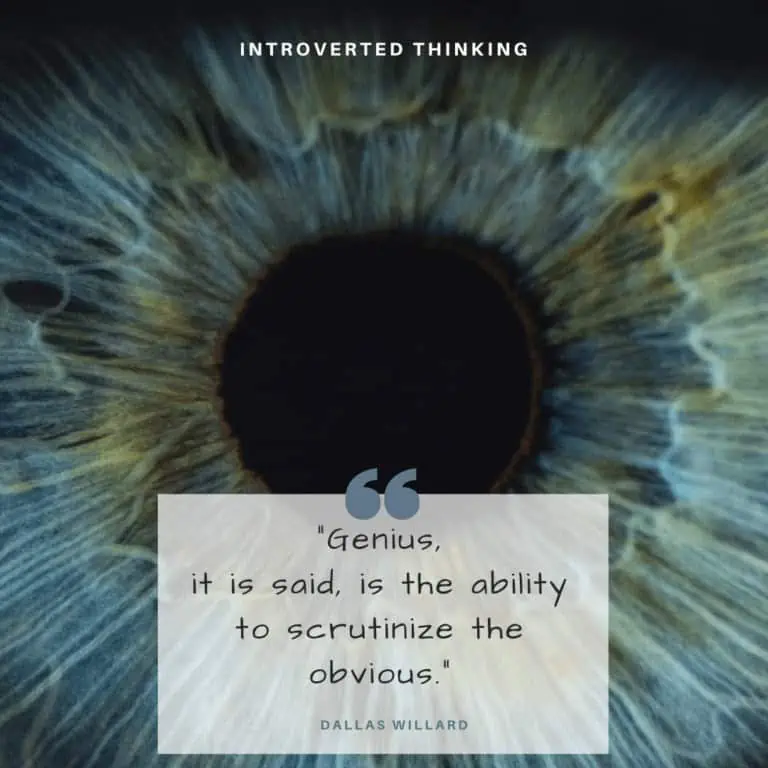
If you identify as an INTP or ISTP, your dominant function is Introverted Thinking (Ti). You are all about logical consistency, precision, and accuracy. Your view of the world is fundamentally analytical and objective. You are the one who is often pulling things apart, figuring out how they work, and then putting them back together again—both literally and metaphorically. While this description might not encapsulate all aspects of your personality, it provides a snapshot into the core strength that underpins your personality type.
Introverted Thinking drives you to understand the principles underlying the world around you. You are drawn to complex problems or (at times) complex theories, and enjoy dissecting them to find clarity and insight. You value intellectual honesty and are not one to accept ideas on face value, preferring to question them and verify their accuracy. Your Thinking side encourages you to make decisions based on logic and objective analysis, creating an internal framework of understanding that is intricate and constantly evolving.
When used to its fullest potential, Introverted Thinking can serve as a beacon of clarity and rationality, providing valuable perspectives in a world often ruled by emotions and bias. Embrace it, nurture it, and put it into practice – it is your unique strength.
How To Amplify Your Introverted Thinking as an INTP or ISTP:
- Engage in Logical Analysis: Regularly challenge yourself with puzzles, brainteasers, or complex problems that require logical analysis. This will stimulate your mind and help you refine your analytical abilities.
- Seek Knowledge Continuously: Develop a habit of continuous learning. Read widely, engage in discussions, attend seminars, or enroll in online courses. The more knowledge you have, the more refined your internal logical framework will be.
- Practice Clear and Concise Communication: Try to communicate your thoughts and ideas as clearly and succinctly as possible. This ability to cut through the noise and say exactly what you think in as precise a way as possible is one of the strengths of Introverted Thinking.
- Embrace Curiosity: Allow yourself to explore new ideas and perspectives, even if they challenge your existing beliefs. This openness to new information is crucial to the development of your Introverted Thinking.
- Reflect Regularly: Take time each day to reflect on what you have learned or experienced. This reflection will help you integrate new information into your internal framework.
- Practice Objectivity: Make an effort to view situations from an unbiased standpoint. Objectivity is a key strength of Introverted Thinking and practicing it can lead to deeper insights.
- Learn From Mistakes: Don’t be disheartened by mistakes or failures. Instead, view them as learning opportunities that can help you refine your thinking and problem-solving skills.
- Analyze the Roots of Your Beliefs: Take time to introspect and delve deeper into your personal history and perceptions. Analyze the logic and truth behind your beliefs to truly understand what you stand for.
- Engage in Strategy Games: Strategy games, such as chess or Sudoku, require you to think through the logical consequences of your moves, thus honing your analytical skills.
- Expand Your Vocabulary: Enhance your language prowess by engaging in activities like crossword puzzles, reading diverse genres, or writing regularly. A rich vocabulary aids in clear and precise communication.
- Adopt a Questioning Approach: When faced with a problem or situation, adopt an inquisitive approach. Ask questions to gather as much information as possible, so that you can really flesh out the categories needed to make an objective assessment.
- Educate Yourself About Logical Fallacies: Understand and familiarize yourself with common logical fallacies. Recognizing these fallacies when used by others can help in more effectively navigating conversations and discussions.
- Master the Art of Tactful Honesty: While truthfulness is admirable, its impact is often determined by its delivery. Discover ways to communicate your truth tactfully, making it more palatable and receptive to others.
Find out more about ISTPs and INTPs: How You Use Introverted Thinking, Based On Its Location in Your Cognitive Function Stack
ESTJs and ENTJs – Extraverted Thinking

If you identify as an ESTJ or ENTJ, your dominant function is Extraverted Thinking (Te). As an Extraverted Thinker, you are pragmatic, goal-oriented, and efficient. You focus on the external world and seek to organize it, often through the creation and implementation of systems and procedures. This function allows you to take in large amounts of data, analyze it, and make decisions based on it without getting overwhelmed.
Extraverted Thinking is about taking action, and you may find yourself energized by planning, organization, and executing tasks. You have a strong focus on productivity and results, and you are likely to be a natural leader, able to delegate tasks and manage resources to achieve your objectives. Your decision-making process is based on logic and rational thinking, and you strive for objective fairness.
When embraced and well-utilized, Extraverted Thinking can lead to great organizational skills, a knack for leadership, and an ability to make sound, rational decisions swiftly. It’s a unique strength that sets you apart.
How To Amplify Your Extraverted Thinking as an ESTJ or ENTJ:
- Embrace Leadership Roles: Look for opportunities to take on leadership roles, either in your professional life or in personal projects. This will allow you to practice your natural ability to organize and manage resources effectively.
- Prioritize Efficiency: Look for the most efficient way to accomplish tasks. This might involve streamlining processes, eliminating unnecessary steps, or using technology to automate tasks.
- Develop Your Decision-Making Skills: Practice making decisions swiftly and confidently. Remember, it’s better to make a decision and learn from it than to avoid making decisions out of fear of being wrong.
- Embrace Structure and Order: Look for ways to create structure and order in your life. This could be as simple as organizing your workspace or creating a daily routine.
- Learn From Failures: Don’t be afraid of failure. Instead, see it as an opportunity to learn and improve. Analyze what went wrong and use this information to make better decisions in the future.
- Engage in Strategic Planning: Regularly try out activities that require strategic thinking, such as chess, business simulations, or project planning.
- Cultivate Patience: While it’s natural for you to want to see quick results, it’s equally important to cultivate patience. Remember, the most worthwhile achievements often take time, and there will always be a certain amount of setbacks along the way.
- Value Teamwork: Although you’re a natural leader, remember that the best leaders take time to value the input and contributions of their team members. Foster a collaborative environment where everyone feels heard and valued.
- Regular Reflection: Take time to reflect on your actions and their outcomes. This can help you identify areas for improvement and evolve your strategies.
- Foster Emotional Intelligence: Exercising your emotional intelligence can give you a better understanding of the people you lead, allowing you to motivate them more effectively and to have a better-running team.
- Assess Pros and Cons: When faced with a decision, take the time to weigh the pros and cons of each option.
- Resource Management: Pay particular attention to your resources, whether it’s a budget, time, or physical items. Efficient management of resources is a direct reflection of effective Extraverted Thinking. Regularly review your usage and seek ways to cut down on waste or clutter.
- Break Down Goals: If you have a large goal, break it down into smaller, more manageable steps. This approach not only makes the task seem more manageable, but also helps in tracking your progress and maintaining motivation.
- If/Then Exercises: Engage in if/then exercises to identify your core needs. For example, “If I get X done, then I will get closer to Y. If I get Y, then I will get Z.” Continue this process till you discover what your basic fears, desires, and values are. You may find that some of the things you’re working towards require a different approach altogether.
- Engage in Constructive Arguments: Involve yourself in constructive debates where you can defend your beliefs logically and objectively. This practice not only sharpens your reasoning skills but also opens up the possibility of gaining new insights from counterarguments.
Find out more about ESTJs and ENTJs: Here’s What ENTJs, ESTJs, ENFJs, and ESTPs All Have in Common
What Are Your Thoughts?
Did you love this article or hate it? Have you tried any of these methods to enhance your dominant function? Do you have other strategies or personal stories that you would like to share? We would love to hear about your journey towards personal growth! So leave us a comment below!
References:
Functions of Type: Activities to Develop the Eight Jungian Functions by Gary Hartzler and Margaret Hartzler (2005, Telos Publications)
Building Blocks of Personality Type: A Guide to Discoveringh the Hidden Secrets of the Personality Type Code by Leona Haas and Mark Hunziker (2014, Eltanin Publishing)




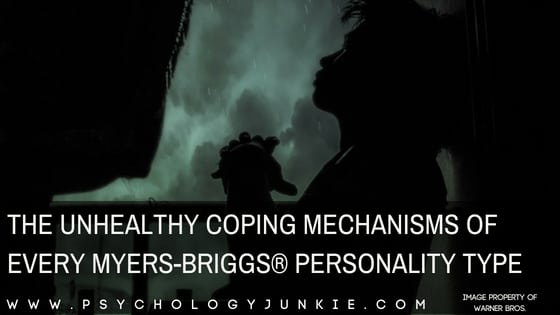



This is so awesome. I’m going to pick one of these tips every day and work on it.
At about 10 years old, I noticed odd things in and about the world around me. Further observation, questioning and learning, helped me begin to understand that I should always listen to that “inner voice”. (Not the “listen to your conscience voice”, though at times I think it may be interpreted that way, depending on the “message” it is conveying.)
As I continued to observe, I was intensely curious why it was occurring. I eventually realized this process actually made sense and proceeded to learn as much about how the mind works, as I could, in school. I tested my “voice” many times and learned to trust it, as the years past.
Seeing the end result of an object or situation with a defined purpose and process, makes it much easier to build. Was I always totally correct, no—but I was right far more than I was wrong and I learned so very much when my construct failed to meet the requirement(s) or had some social subtleties that needed refining. (By the way, it’s really tough to describe how a project or situation will look, when the person(s) you are describing it to has little or no ability to visualize what you are “seeing / saying”. Be patient, when they finally can touch and see the fruit of your labors, most are usually pleased and surprised— if they are not, it was still fun to build!)
One must learn to allow the “voice” to work, for attempting to push it will just frustrate you and slow the process. You will never know when it is ready to speak, but when it does, listen carefully, for it’s ability to see patterns, potentials and end results, works much differently than does your conscious mind. Will it always be correct? No, but I believe and my experience shows it to be correct, substantially, more of the time than random chance would predict.